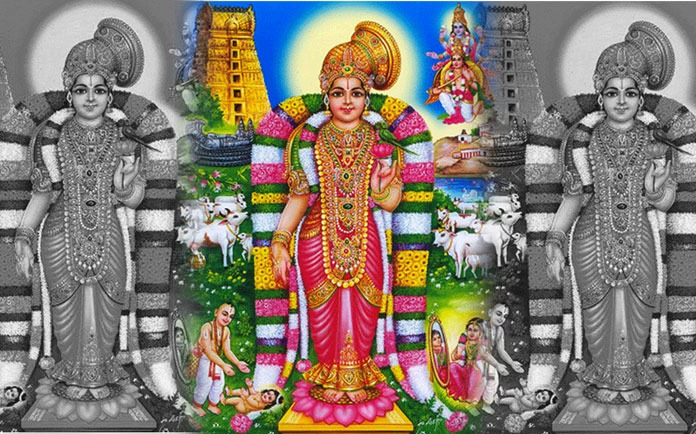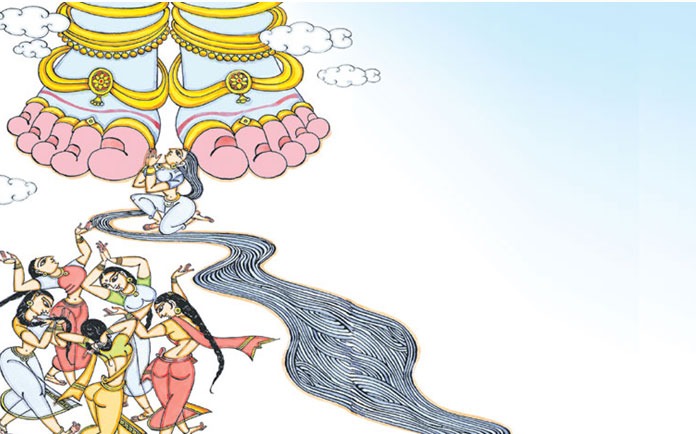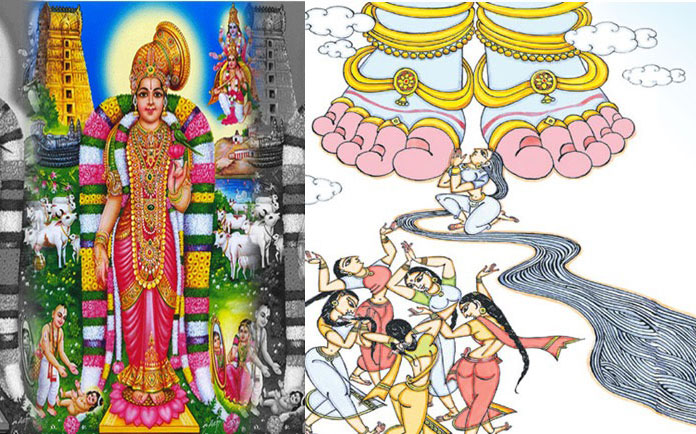| Transliteration from Tamil | Translation into English |
| Margazhi thingalmadhiniraindhanannalal Niradapodhuvir, podhuminoneridaiyeer Seermalgumaayppadichchelvachirumeergal Koorvelkodunthozhilannandagopankumaran Erarndhakannniyasodhaiilansingam Karmenichengannkadirmadiyam pol mugathan Narayananenamakkeparaitharuvan Parorpugazha p padinthelor empavai. | Nature shining in moonlight of Margazhi month Come dear friends let us bathe before the Sunrise Team of enriched and enlightened devotees of our rich village Where the Nanda wields protective spear for his son Lotus eyed young cub of mother Yashoda His resplendent face with eyes shining like Sun and Moon Aiming to reach ultimate Lord Narayana Let us commission the mission together |
The Goda’s poem Tiruppavai has an in-built scheme of vratha (the mission) with three parts. First part introduces the mission contemplated to worship Narayana in the form of Sri Krishna, Kanhaiah, or Kaanha. First part- initial five songs (Paashurams) explain the rules of month-long Deeksha, (MaasaVrata), do’s and don’ts, proposed in first two songs, followed by description of glory of Narayana in 3 songs. Part 2 (Songs 6 to 15) Goda preaches togetherness as strategy for mutual inspiration and sustaining the enthusiasm. Goda selects the members of the team, goes to each of their house and wakes them up in early hours’ foggy winter. Ten friends are assumed as Gopikas of Brindavan. In fact, each represents an Alwar. Thus, she invokes ten Alwars. (There are in all 12 Aalwaars. She is the eleventh Alwaar in making and another is added later). She deals with different attitudes and wavelengths of perception, with variety of conversations to convince them to get up soon and join the mission. She praises the glory of beautiful and enchanting nature of the season, different creatures enriching the dawn and through that Creation and the Creator is invoked.
She worships the universal environment consisting of Pancha Bhutas, five natural super elements- earth, air, water, fire, and the space. Part III has two sections, (i) Paashuram 16 to 20 renders suprabhatam for Lord Krishna in his father’s palace, while next section (ii) from verse 21 to 28 fills with the description of His Guna and Vaibhava, the glory and beauty of divine Krishna referring to his adventures in destroying the evil forces and establishing righteousness. Paashuram 29 is Mangalaashasanam, praying for peace and well being of Lord and final Paashuram 30 explaining the blessings and serene consequences of Vratha after its successful completion.

Essence of First song
It was nice time for starting any Vrata. On earth the nature is beautiful. Even God likes to come down and enjoy the breeze on banks of Yamuna in Brindavan. Sri Villiputtur is also transformed into Brindavan in her dreams. The quantum of one year in our world is just a full day for Angels (Devathas) in different world. Dakshinayanam (Sun swerving to south – July to January) is the night for them and Uttarayanam (Sun tilting to north – from January to July) is the day. Even as Sun tilts from southern route to north side, the month Marga Sheersha greets us. It is counted as the pre-dawn hours. Serene and silent morning with fresh breeze of air and quietening light that inspires fresh ideas and brings smiles on faces. The time is conducive for prayers and mediation. Let us all go to the river for holy bathing. When we sing in praise of Krishna and remember his good deeds, all our evils get washed off. That is real sanctification of our persons. This mission is our Deeksha. This vratha is for the Super soul- Paramaatma. Serene nature of our village reminds us the Vrepalle, where the spear wielding Nanda King standing to protect his son Krishna to ward off the sudden attacks of demons sent by Kamsa. Let us all become Gopas and Gopikas. The God Narayana descended amongst us to elevate our lives and thoughts. He came to be with us like a simple innocent cowherd. Krishna, the cub in the lap of Yashoda, who shines like cloud and rains blessings like a kind cloud. Narayana is the journey and the destination too. He is the Vratha and purpose of the Vrata. He is the tool and route to reach Him. Let the mission to reach Him begin in universally acceptable way. Let everyone recognize it compliment. Come let us go and invoke Him asking for an instrument of music to sing in His praise.
Also Read: Goda’s Tiruppavai
He is everywhere
NAARA + AAYANA is a combination of two expressions. All Naarams (beings) depend on Him. He bears all of them, resides in each iota of Nature. Vaasu Deva. Being in them, He protects the being. Or He preserves all beings in Him. Aayana reflects all divine and special qualities and characters of Krishna. If you step out to reach Him, he rushes to meet your extended hand. Accessing Him is easiest way. Saulabhyam. He is very dear and very nearer to us as He resides in us or we reside in Him. Saameepyam. He is above all of us, all Lokas. Param. Ultimate, in higher altitude. Goda is giving us the mantra to read him, showing the route to tread to reach, and scheme to achieve Him. You need nothing to prepare. Deep desire and strong decision to commission this mission is enough, rest will fall in line.
Goda’s first song indicates the components of remaining 29 songs, prepares the men and women for choosing path of Gopas and Gopikas to gain Hari in Krishna form. The mission aims at Krishna. Krishna is the only way to reach Krishna. Nothing else.




